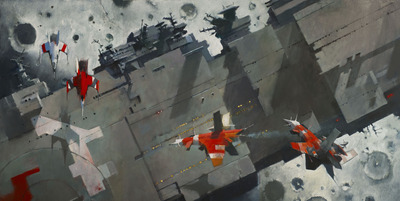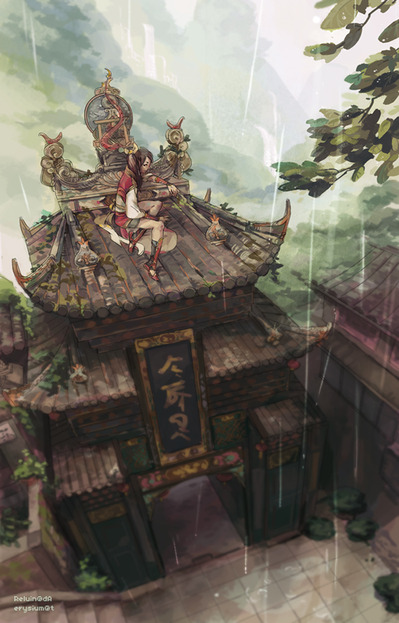Hugo Awards: Best Artists
The are two awards for artists in the hugos, one for Pro Artist and one for Fan Artist. The line between these two categories seems to be blurring every day, with some publishers trolling the likes of DeviantArt to get their book covers and whatnot, but there are two categories, and so here we are. The voter’s packet comes with sample works for most of the Pro Artists and only a few of the Fan Artists. This is a little strange, as I’m not sure how much to weight the packet works. In general, I tried to base my decisions on what was included in the packet, though I also tried to check out their websites.
For Pro Artist, 5 out of 6 nominees included stuff in the packet, so I’m mostly basing my decisions on that, though I did look at each website as well.
- John Harris – These were my favorite of the nominated works, very SF and focused on landscapes/spacescapes with spaceships and whatnot. All of Scalzi’s Old Man’s War books have Harris covers (and if I’m not mistaken, Scalzi likes to credit Harris as one reason why his books sell), and so is one of this year’s nominees, Ancillary Justice (pictured above).
- John Picacio – By far, the best presentation in the voter’s packet, with clean versions of the art next to the actual book cover (with the title and other text, etc…) And the art is pretty good too. I was particularly taken with the piece entitled “La Luna”.
- Julie Dillon – These tend to be fantasy focused, and while some are bog standard examples of the stereotypical thing you’d picture a fantasy book as having, there are several that were much more inventive and striking.
- Galen Dara – The voter’s packet was inexplicably light for this artist, with only three entries, all of which were based on The Wizard of Oz. Left to only that, I may have ranked this lower, but there’s some fantastic art at the website, so I guess that needs to be taken into account as well.
- Fiona Staples – This is the only artist without anything in the packet. She is the artist on a comic book series called Saga. I’ve not read that, but I found a bunch of cover art, which tends to be what this is based on. Still, I can’t help but think her lack of info in the packet is serving her poorly.
- Daniel Dos Santos – Something about all of these rubbed me the wrong way. Very focused on human beings and actually kinda repetitive in their composition. Nothing really bad or anything, but I was more taken with some of the above.
For Fan Artist, only 3 had included works in the packet, and two of them only included 3 entries, which makes it hard to judge.
- Sarah Webb – A clear favorite here, with many fantastic, original works (9 of which are in the packet). Nothing derivative here, and indeed, each of these paintings sorta cries out for a story, which is all you can ask from an artist.
- Mandie Manzano – Nothing in the packet, but from her website, it appears that she specializes in a sorta faux stained-glass style that actually works rather well.
- Spring Schoenhuth – Another not included in the packet, and indeed, most of this work is actually not painting but sculpture or jewelry. They are distinctly SF in nature, though I get the impression that this sort of thing isn’t normally nominated. From what I can see, these are mostly pretty good though.
- Brad W. Foster – Only three pieces included in the packet, and two seem pretty standard stuff, but they’re colorful and pleasant enough. The last one, though, is very playful and complex, if a bit rough around the edges (and it looks like it was stitched together weirdly).
- Steve Stiles – My clear least favorite, and exactly what you fear when someone says “Fan Artist”, though perhaps that’s being too harsh.
So there you have it. Stay tuned for more Hugo blathering, but don’t worry, only a few weeks left of this nonsense.

